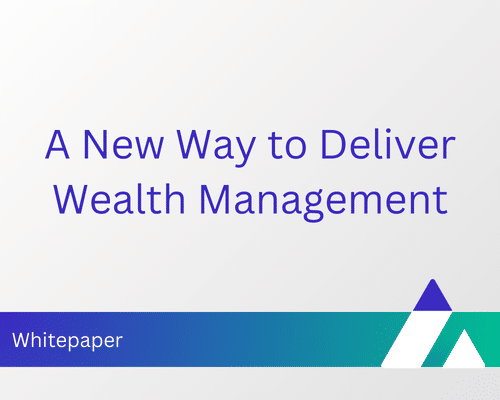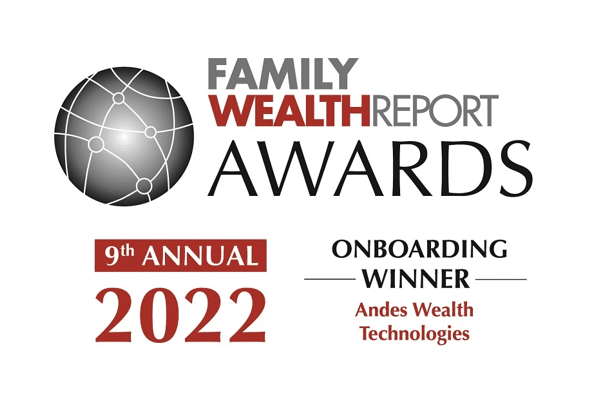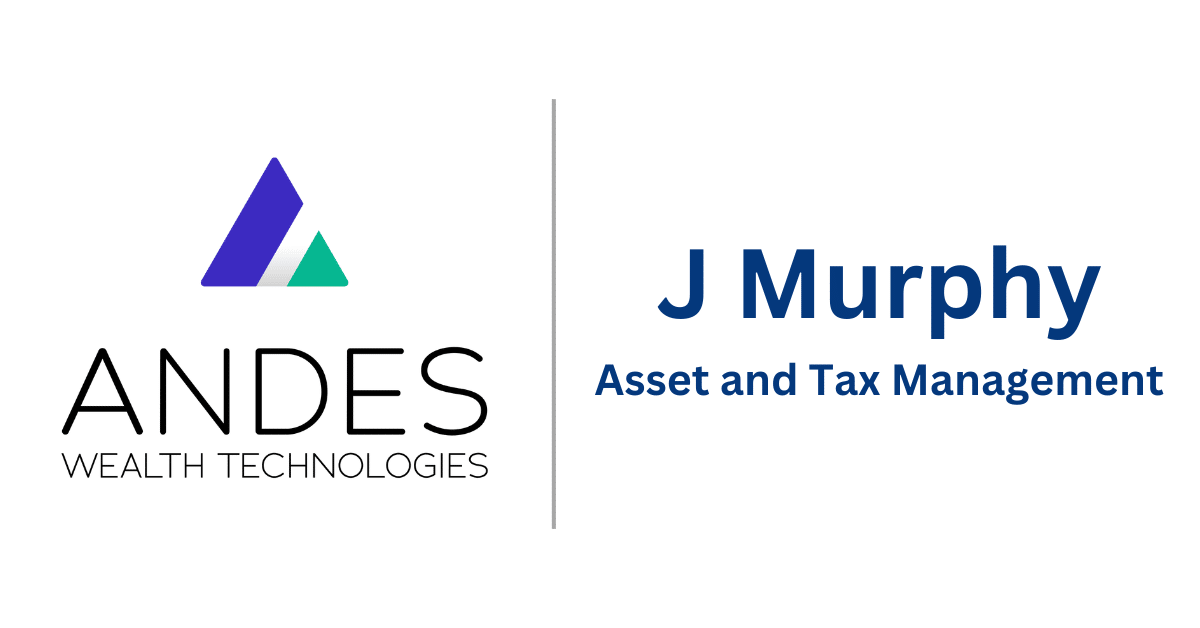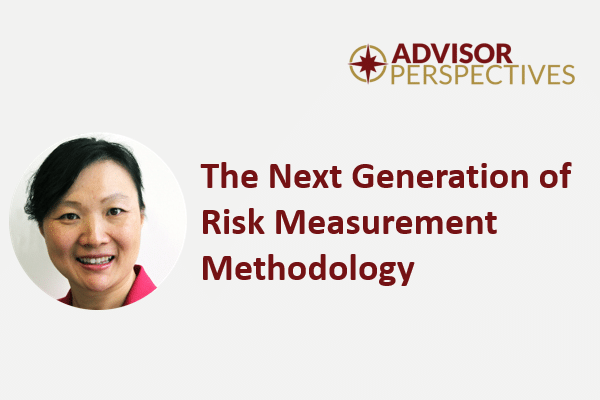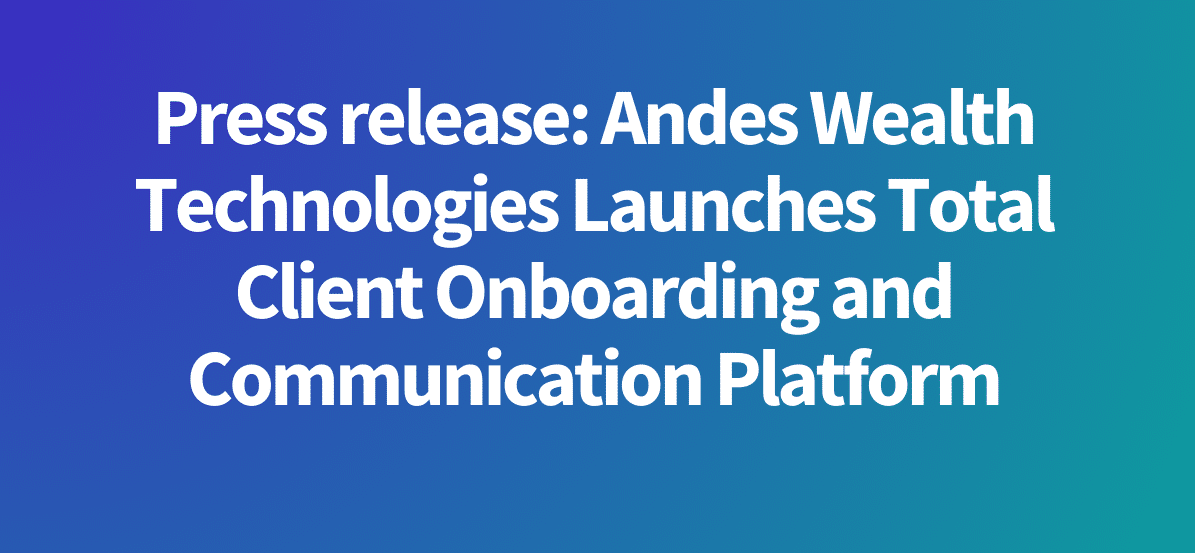7 Elements Every Investment Policy Statement Should Address
An investment policy statement (IPS) can make navigating the complexities of financial decisions and investments easier, no matter how challenging the market environment.
Andes Wealth Technologies Announces Integration with Advyzon
BOSTON, MA, US, June 6, 2023/EINPresswire.com/ -- Andes Wealth Technologies, the first company to combine behavioral finance with risk visualizations, empowering
A New Way to Deliver Wealth Management
An investment policy statement (IPS) can make navigating the complexities of financial decisions and investments easier, no matter how challenging the market environment.
Andes Wealth Technologies Announces Risk Analysis Integration with Redtail CRM
Boston, MA, April 25, 2023 – (EIN Presswire) – Andes Wealth Technologies, the first company to combine behavioral finance with
Helen Yang – Andes Wealth Technologies Joins Global Elite With WealthBriefing WealthTech Americas Award 2023
Leading wealth management industry participant, Helen Yang - Andes Wealth Technologies, has joined the ranks of an elite global group
Andes Wealth Technologies Announces Patent on Investor Profiling and Behavioral Risk Management System
Andes Wealth Technologies, the first company to combine behavioral finance and risk analytics, empowering financial advisors to differentiate, satisfy Reg
Andes Wealth Technologies Wins Top Thought Leadership and Education Honors at the 2022 Thinkadvisor Luminaries Awards
November 21, 2022, New York, New York - Andes Wealth Technologies, the first company to combine behavioral finance and risk
Independent RIA Waterway Selects Andes Wealth Tech
BOSTON--(BUSINESS WIRE)--Andes Wealth Technologies, an innovative wealth technology company, announces that it has signed Waterway Wealth Management, a Texas-based RIA
Risk Tolerance Assessment: Why should you take it?
Helen Yang published an article in Advisor Perspectives on September 13, 2022, that explores the intricacies of building a comprehensive risk tolerance assessment tool. Authored by experts in the field, the article emphasizes the need for a nuanced approach that goes beyond the traditional risk tolerance questionnaires.
Andes Wealth Technologies Won Two Categories in 2022 Wealthies
New York, September 9, 2022 /Business Wire/ -- Andes Wealth Technologies, the first company to combine behavioral finance and risk
Andes Wealth Technologies Awarded Patent on Investor Risk System
June 22, 2022 11:45 AM Eastern Daylight Time BOSTON--(BUSINESS WIRE)--Andes Wealth Technologies, the first company to combine behavioral finance and
A Deep Analytic Perspective of the 2022 Market Correction
Helen Yang's recent article in Advisor Perspectives walks through how financial advisors can combine behavioral finance and deep analytics to help clients better understand their emotions and tell a compelling, long-term story. Unlock the strategies to navigate uncertainties and stay ahead in your financial journey with this profound analytic perspective on the 2022 market correction.
Why aren’t there more female FinTech leaders onstage?
CEO Helen Yang published an article in Think Advisor about how outdated stereotypes and gendered expectations are still keeping women from reaching their full career potential. Women are not encouraged to pursue careers in finance and technology because the perception that women aren't as smart as men persists. Women do not want these extra barriers, but they also don’t want to be patronized or used as window dressing.
Andes Named Winner of Family Wealth Report Award
BOSTON, May 9, 2022 /Business Wire/ -- Andes Wealth Technologies, an innovative wealth technology company, has been named the winner
Andes Named Winner of WealthTech Americas Award
BOSTON, March 21, 2022 /Business Wire/ -- Andes Wealth Technologies, an innovative wealth technology company, has been named the WealthBriefing 2022 WealthTech
How Risky is Bitcoin?
This article written by Helen Yang in Advisor Perspectives looks into the risk score of Bitcoin. She shows that a risk scale of 0-100 can be achieved by multiplying the volatility by five, in which case the risk score of cash is 0, and equity is 100. Using this scale, the risk score of bitcoin is 400 and TSLA (Tesla) 300. I go on to explain the bitcoin mining process and share a few considerations about investing in bitcoin.
Andes Wealth Tech Announces Integration with Orion
... BOSTON, Feb. 17, 2022 /PRNewswire/ -- Andes Wealth Technologies, an innovative advisor technology company, today announces its integration with Orion
J Murphy: Switching to Andes Platform
J Murphy Asset and Tax Management decided to switch to the Andes Wealth Platform to support conversations with clients on risk, after running it side by side with another platform for three months and initially tried another platform.
Independent RIA INVST Selects Andes Wealth Tech for Onboarding
BOSTON, Feb. 7, 2022 /PRNewswire/ — Andes Wealth Technologies, an innovative wealth technology company, announces that it has signed up INVST,
Seeking Differentiation in Wealth Management: Andes Wealth in Wealth Management 2022 Market Outlook
Andes Wealth CEO Helen Yang, CFA, published an article recently in the Wealth Management 2022 Market Outlook entitled "Seeking Differentiation in Wealth Management." To fundamentally transform the traditional cookie-cutter service, we need a new theory, and this theory is the Adaptive Markets Theory. Developed by Dr. Andrew Lo from MIT, the Adaptive Market Theory reconciles behavioral finance with efficient markets.
Using Deep Analytics to Align Risk Perception
CEO Helen Yang recently published an article on AdvisorPerspectives.com entitled "Using Deep Analytics to Align Risk Perception." Our perception of the market is influenced by recent events, a behavioral trait known as the “recency bias.” Risk perception is an integral part of a risk-measurement framework, and irrational responses are often triggered by the wrong perception of market risk.
Case Study: Waterway Wealth Management
How Waterway Wealth Management Uses Behavioral Finance Systematically to Effectively Communicate with Clients. About Waterway Waterway Wealth Management, founded in
The Next Generation of Risk Measurement Methodology
On August 9, 2021, Helen Yang, CFA, founder and CEO of Andes Wealth Technologies, published an article titled "The Next
The Disconnect Between Risk Tolerance Questionnaire and Portfolio Decision
Andes Wealth CEO Helen Yang was recently featured in the WealthManagement.com Midyear Outlook with an article entitled "The Disconnect Between Risk Tolerance Questionnaire and Portfolio Decision." “Many firms use model portfolios to standardize their investment practices, and the most direct approach is to ask the client to pick a model in the model set based on the upside/downside tradeoff that the client is most comfortable with (see chart). It is like going to a café that offers salad, soup, sandwich, and hamburger, and you pick one based on your appetite.”
The Power of Personalization in Financial Services
CEO Helen Yang was a recent guest on the In the Suite podcast. Listen and hear more about The Power of Personalization in Financial Services.
Press release: Andes Wealth Technologies Launches Total Client Onboarding and Communication Platform
Andes Wealth Technologies, an innovative wealth technology company, announced today the release of an integrated, comprehensive, and powerful client onboarding and communication platform to help advisors enhance client relationships and better manage their practices.
Case Study: INVST
Andes Wealth Technologies enables INVST to bring together their investment model recommendations with clients’ risk profiles and behavioral assessments,
Andes Wealth Tech Announces Integration with Black Diamond
Andes Wealth Technologies, an innovator in advisor technology, recently announced a new integration with SS&C Technologies’ Black Diamond® Wealth Platform. Andes
Wealth Management Hyperloop: Andes Wealth Featured in Javelin Strategy
“One way to illustrate possible tradeoffs among portfolio models or risk brackets is to show the upside and downside of each model and then ask the client to choose the model with which she feels most comfortable. This is the approach pursued by risk profiling vendor Andes Wealth, which takes the further step of automating the creation of an IPS.”
Andes Wealth featured in A Comparison of Risk Tolerance Products by Bob Veres
Bob Veres explores and compares Risk Tolerance Products, featuring Andes Wealth Technologies among others. Gain valuable insights and make informed decisions in your financial journey. Check out the detailed analysis by Bob Veres on Advisor Perspectives here.
How to Reduce Panic with Passion and Credibility
Andes Wealth CEO Helen Yang recently published an article in Advisor Perspectives entitled "How to Reduce Panic with Passion and Credibility." As the Coronavirus pandemic spreads, “Even the most rational clients are subject to emotions, especially during the current coronavirus outbreak when the threat is both financial and physical. “
Andes Wealth Featured in Financial Planning Article
CEO Helen Yang was recently featured in an article in Financial Planning by Suleman Din entitled ‘Do more for me’: Clients demanding digital banking options.
How Can Advisors Add Value and Defend Fees?
Check out a recent article by CEO Helen Yang in Wealth Management: "How Can Advisors Add Value and Defend Fees?" Discover strategies to showcase your value and justify fees in an ever-evolving financial landscape. “Advisors need to move beyond ‘buy and hold’ and ‘high risk, high return’ to deal more with clients’ behaviors and emotions.”
Andes Wealth Featured in Michael Kitces Nerd’s Eye View
Andes Wealth is thrilled to be featured in the Michael Kitces Nerd’s Eye View and in the Advisor FinTech Map. “It’s tough to stand out in the space for risk profiling tools, but Andes Wealth has built some innovative features into their product including behavioral finance that should help advisors know their clients better and identify at-risk accounts.” — Craig Iskowitz
New Tech Help To Manage Your Retirement And Investments: Andes Wealth in Forbes
“With the tagline ‘Where Behavioral Finance Meets Analytics’, the company’s Real-Time Risk Monitor lets financial advisers visualize and communicate investment risk for clients; its Risk Tolerance Test and behavioral surveys help clients understand how much investment risk they can tolerate, and its Cognitive Ability Test lets advisers know if their clients are having cognitive issues that could impede their ability to make wise personal finance decisions.”



